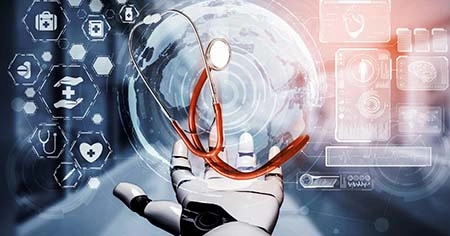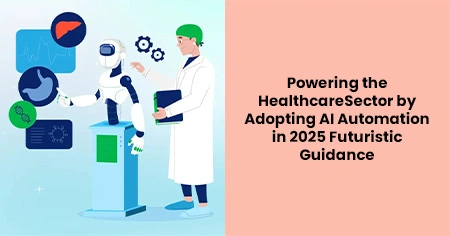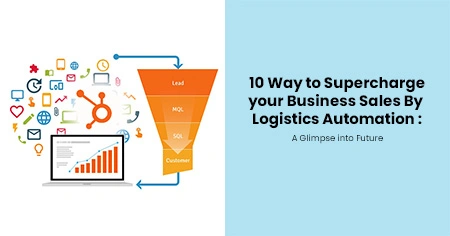AI in healthcare manifests itself in various ways, including discovering new connections between genetic codes, powering surgery-assisting robots, automating administrative work, personalizing treatment options, and much more.
With healthcare AI investments expected to reach $45.2 billion by 2027, artificial intelligence is no longer a faraway concept; it is quickly becoming a vital component of current medical practice.
AI's potential to optimize operations, improve clinical decision-making, and provide individualized patient care radically changes how healthcare organizations approach treatment.
The healthcare industry is set to experience significant advancements from AI-enabled diagnostics to individualised treatment regimens. Let's explore the powering of the healthcare sector by Adopting AI Automation in 2025.
What is AI in Healthcare?

AI in healthcare is the application of machine learning, natural language processing, deep learning, and other AI technologies to improve the experiences of both healthcare workers and patients. AI's data-processing and prediction skills allow health practitioners to manage their resources better and proactively tackle many facets of healthcare.
With this technology, doctors can make more accurate diagnoses, health administrators can find electronic health information more quickly, and patients can receive more timely and individualized care.
Benefits of AI in Healthcare
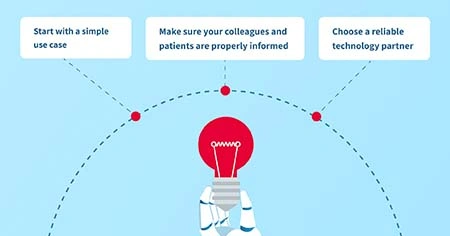
As medical organizations use AL and ML algorithms to cope with large amounts of data, AI's benefits in healthcare extend beyond data processing.
Enhanced diagnostic accuracy
AI algorithms can evaluate vast databases of medical records, pictures, and diagnostic tests to help clinics make more accurate and timely diagnoses. This could lead to earlier illness detection and better treatment outcomes.
DPersonalized patient care
AI makes tailored treatment plans possible by assessing patient data such as medical history, genetics, and lifestyle factors. Such AI solutions for healthcare are typically cloud-based, with data collected on a medical platform or online application. Personalization can increase patient satisfaction, contributing to better diagnosis and results.
Efficient administrative tasks
AI automates appointment scheduling, medical record management, and billing processing as part of a hospital administration system. This efficiency saves healthcare practitioners' time, decreases administrative responsibilities, and minimizes errors, allowing them to focus more on patient care.
Key Areas Where AI Automation is Transforming Healthcare
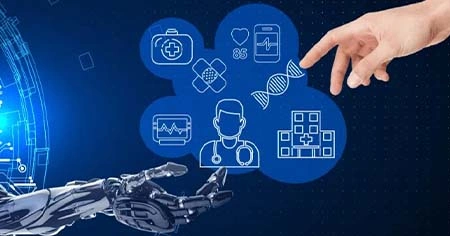
To help you comprehend the quickly expanding field, we've compiled a list of examples and application cases for AI and healthcare.
AI in medical diagnosis
Every year, over 400,000 hospitalized patients suffer unnecessary damage, resulting in 100,000 fatalities. Given this, improving the diagnostic process is one of AI's most exciting healthcare applications. Incomplete medical histories and high caseloads can result in fatal human errors. AI is immune to these influences, allowing it to forecast and diagnose diseases faster than most medical personnel.
AI in drug discovery
The medication development industry is hampered by rising development costs and research that requires thousands of human hours. Each drug's clinical trial costs an estimated $1.3 billion, and only 10% of those treatments successfully reach the market. AI is speeding up this process by assisting with drug creation, anticipating side effects, and selecting optimal candidates for clinical trials.
AI in patient experience
AI can augment digital communications by providing patients with scheduling reminders, targeted health suggestions, and suggested next steps. AI's ability to aid in health diagnosis enhances the pace and accuracy of patient visits, resulting in faster and more individualized care. By efficiently offering a seamless patient experience, hospitals, clinics, and physicians may serve more patients daily.
AI in healthcare data management
Highly useful information can sometimes go lost in a forest of trillions of data points. Furthermore, the inability to connect key data points impedes the development of new medications, preventative medicine, and accurate diagnosis. AI's capacity to manage enormous amounts of data allows it to break down data silos and connect information that would otherwise take years to process. This can save time and money on healthcare software development processes, resulting in more efficient everyday operations and patient experiences. By integrating Real-Time Agent Assist, these solutions can further empower healthcare staff with instant insights during patient interactions, ensuring more responsive and tailored support.
AI in robotic surgery
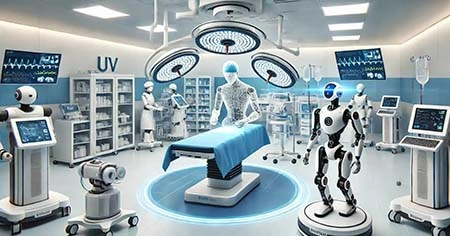
Hospitals use artificial intelligence and robots to help with everything from less invasive treatments to open heart surgery. Surgeons can control a robot's mechanical arms while seated at a computer panel. The robot gives the doctor a three-dimensional, magnified view of the surgical site. The surgeon then directs the other team members, who collaborate closely with the robot throughout the operation. Robot-assisted operations have resulted in fewer surgery-related problems, reduced discomfort, and faster recovery times.
Virtual assistants and chatBots
AI-powered virtual assistants and healthcare chatbots are critical in remote patient care, allowing medical professionals to concentrate on complex concerns. These tools provide individualized health advice and pharmacy recommendations and help consumers find drug information quickly. Responding quickly and accurately saves patients from waiting for professional advice.
Patients can also utilize chatbots to make appointments and confirm upcoming visits. AI-powered virtual assistants offer medical advice and support. Healthily's chatbot provides symptom checks and medical guidance, increasing patient's access to healthcare services.
Electronic health records (EHRs)
AI technology is increasingly vital for managing electronic health records (EHRs). It permits the analysis of large amounts of medical data to identify patterns that aid in illness prevention and therapy. Moreover, as hospitals and clinics look to improve their data management and analytics capabilities, many are turning to specialized solutions that both increase efficiency and address regulatory concerns. Partnering with a trusted provider through a data abstraction outsourcing service streamlines the collection, validation, and reporting of clinical information—freeing internal teams for higher-value tasks while minimizing errors in critical datasets such as electronic health records (EHR).
AI and healthcare technology analyze EHR data to identify high-risk individuals and develop individualized preventative tactics.
Artificial intelligence forecasts illness risks based on medical history, lifestyle, and genetics, such as diabetes or heart disease. It also detects prescription trends to help prevent harmful drug reactions and suggests alternate therapies. Oracle Health uses AI in its EHR solutions to increase data quality, workflow efficiency, and patient care coordination.
Medical imaging analysis
Medical imaging is one of the most advanced AI-powered healthcare applications. AI analyzes medical imagery to aid in disease diagnosis and therapy. For example, it detects brain tumours in MRI scans, which aids surgery planning.
It diagnoses Alzheimer's disease and dementia in brain scans by analyzing structural alterations. Additionally, AI analyzes retinal scans to detect early-stage diabetic retinopathy, a cause of blindness in people with diabetes.
GE Healthcare's AI-powered Edison platform automates the interpretation of MRI and CT scans, allowing radiologists to discover anomalies faster.
Challenges of implementing AI in the healthcare industry
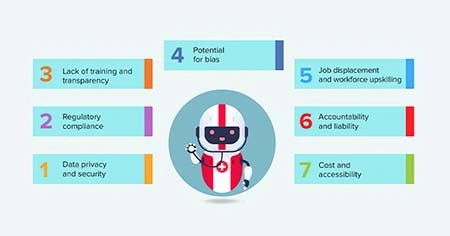
The rise of AI in the healthcare industry is fueled by several enabling factors, including copious healthcare data and a trend of patients becoming more engaged consumers. Nonetheless, the healthcare AI sector environment has problems and obstacles that must be overcome.
Data privacy and security concerns
Organizations must ensure that patient data utilized for AI applications in healthcare is secure and by rules such as HIPAA. To protect critical patient information, use strong cybersecurity encryption and access controls. Regular audits and training programs can verify that employees comply with privacy requirements.
Ethical and regulatory compliance
AI applications in healthcare present ethical questions about patient consent, algorithm bias, and decision-making accountability.
Create ethical norms and governance structures for AI use in your healthcare software development firm.
If you work with a tech vendor, they should frequently audit AI algorithms for bias and guarantee transparency in decision-making processes.
Interoperability and data integration
Healthcare systems frequently use diverse data sources and formats, making data integration for AI applications difficult. Those who intend to use AI solutions in healthcare should invest in interoperable systems and defined data formats to ease data integration.
Application programming interfaces (APIs) can help to improve data transmission between various healthcare systems and platforms.
Why Choose SoftCircles?
SoftCircles is an experienced web developer with a proven track record of providing secure projects to the healthcare industry. We create GDPR-compliant software using ISO-certified methods to provide unsurpassed data protection and regulatory compliance.
From on-demand applications and custom software development to legacy system modernization, our expert teams will use clever algorithms to improve business operations.
Looking Ahead: Embracing an AI-Powered Future in Healthcare
